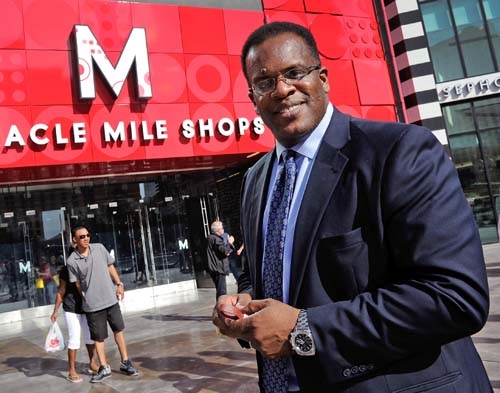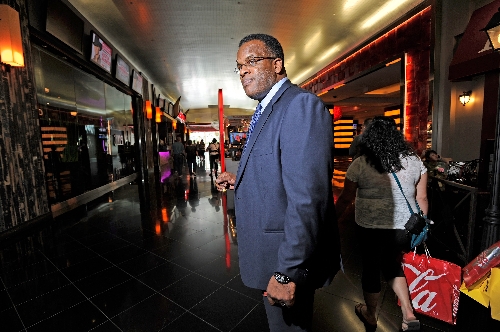Ex-NFL player now runs shopping malls
At 6 foot 4 and 275 pounds, Russell Joyner cuts an imposing figure sitting at a conference table in his office.
Broad-shouldered and solid, he looks every bit the part of the linebacker he played in the NFL as he listens attentively to one of his employees, Amanda Cole. She's describing how a temporary tenant wants to sign a long-term lease for a store in the Miracle Mile Shops at Planet Hollywood Resort.
"Coach them up. Coach them up," says Joyner, 50.
Aside from his physique and a few discreet mementos decorating his office -- a plaque commemorating his college team's appearance in the 1982 Tangerine Bowl hangs on one wall -- that phrase is the only outward sign during the meeting that football was a major influence in his life.
Though the gridiron is worlds away from a shopping mall, Joyner's lessons he learned on the football field are always with him and, in fact, are largely responsible for getting him to where he is today: executive vice president and general manager of a mall that has experienced double-digit increases in sales and foot traffic during the past 15 months.
So far this year, sales are up 14 percent from the same time in 2010, Joyner says. Last year, 25 million people visited Miracle Mile. Currently, foot traffic is up 20 percent. About 73,000 people a day visit the mall.
When Joyner came to what was then called Desert Passage at the Aladdin in 2004, the mall was struggling. Positioned as a high-end retail center, it had too much competition from other luxury retail on the Strip, Joyner says.
"The hotel wasn't necessarily a high-end clientele. The guests would stay at the Aladdin and shop and dine elsewhere," Joyner recalls.
He oversaw the remodel of the Desert Passage into Miracle Mile, a two-year project that was completed in 2007. The mall went from a Moroccan-themed property to what Joyner calls "Hollywood meets Times Square on the Vegas Strip."
Corey Jenkins, managing partner of the Sugar Factory and Cabo Wabo Cantina in Miracle Mile, first met Joyner in 2008. Joyner's persistence went a long way toward convincing him and his partners to open Cabo Wabo there, Jenkins says. Together, they worked to transform the area facing the Strip into a patio that has become a hot spot for people-watching.
"He got that we were something that people would gravitate to," Jenkins says. "He worked with us and developed that patio on the Strip into a real patio. We really turned it into a high energy spot. It's definitely a gathering area and kind of a crossroads of the new Strip."
Joyner was born and raised in the Bronx, N.Y., one of five boys. Growing up, sports were important, especially baseball. His high school was only a few blocks from Yankee Stadium, and some of Joyner's fondest childhood memories involve the Yankees, his favorite team.
Worried that he might get hurt, his mother didn't let him play football until high school, when he promised to make something out of his experience. That led to a full scholarship to Boston College, where he studied business.
Growing up as a die-hard Yankees fan, "it was funny that I went to school in Boston," Joyner says. "But they were a small school with a big-time football program. I had an opportunity to play early and they had a good business program. They made it comfortable for this kid from the Bronx to venture out."
He played the tight end position for his first year of college, but he had such a strong physical presence on the field that his coach decided to move Joyner to a linebacker position on defense.
"Who knows what would have happened if I had gone on as a tight end?" Joyner says.
He served as team captain when Boston College lost to Auburn in the Tangerine Bowl in 1982.
After his senior year of college, Joyner signed a free agent contract in 1983 with the Pittsburgh Steelers. The money wasn't as big as it is today; a rookie made about $45,000. It was a tough decision, signing with the Steelers, Joyner says. He was a longtime fan of the Dallas Cowboys and also had a contract offer from them. Ultimately, it came down to a business decision, he says.
His pro career was short-lived, ending after playing a season for the Indianapolis Colts in 1984. There are few superstar athletes in football. Joyner's story is more typical, he says: journeymen who come and go, spending a season or two with a team before losing their quickness, athleticism, health or skill. After the Colts released him, Joyner had to scramble for a new game plan.
A college buddy offered him a place to stay if he moved to California, so Joyner headed west. His size naturally led to a job in security and he found himself working at a mall. It provided an income and the flexibility to interview for jobs in his field. A couple of years later, he was offered a job in shopping center management.
In 1998, after moving up through the ranks, Joyner became general manager of Hollywood and Highland Center, a $650 million project that included a mall and the Kodak Theatre. Joyner was involved in negotiating a deal with the Academy of Motion Picture Arts and Sciences to host the Oscars in the Kodak Theatre. They signed a 20-year deal, he says, and today Joyner considers that one of his greatest successes in his career.
"Every time they say (during the Oscars), 'Live from the Kodak Theatre at Hollywood and Highland,' I raise my glass," Joyner says.
In 2003, he left to manage the Fashion Show mall. After six months there, the opportunity to take over Desert Passage at the Aladdin came up.
"They were looking for someone with a particular skill set to help them create the vision of what is now Miracle Mile," Joyner says. "It was the best career move I've ever made in 25 years in retail management. It was a leap of faith to go from something very well-established to something that wasn't."
Joyner never imagined he would work in retail. But, you never know what life has in store for you, he says. Playing professional football was his childhood dream.
"My goal was to play football and I did just that, not realizing it was a means to an end," he says. "I had leadership capabilities and a good basic business sense. Football taught me strategic thinking and how to achieve goals. Today, I'm more proud of my degree than any football thing I did."
Contact reporter Sonya Padgett at spadgett@ reviewjournal.com or 702-380-4564.





























